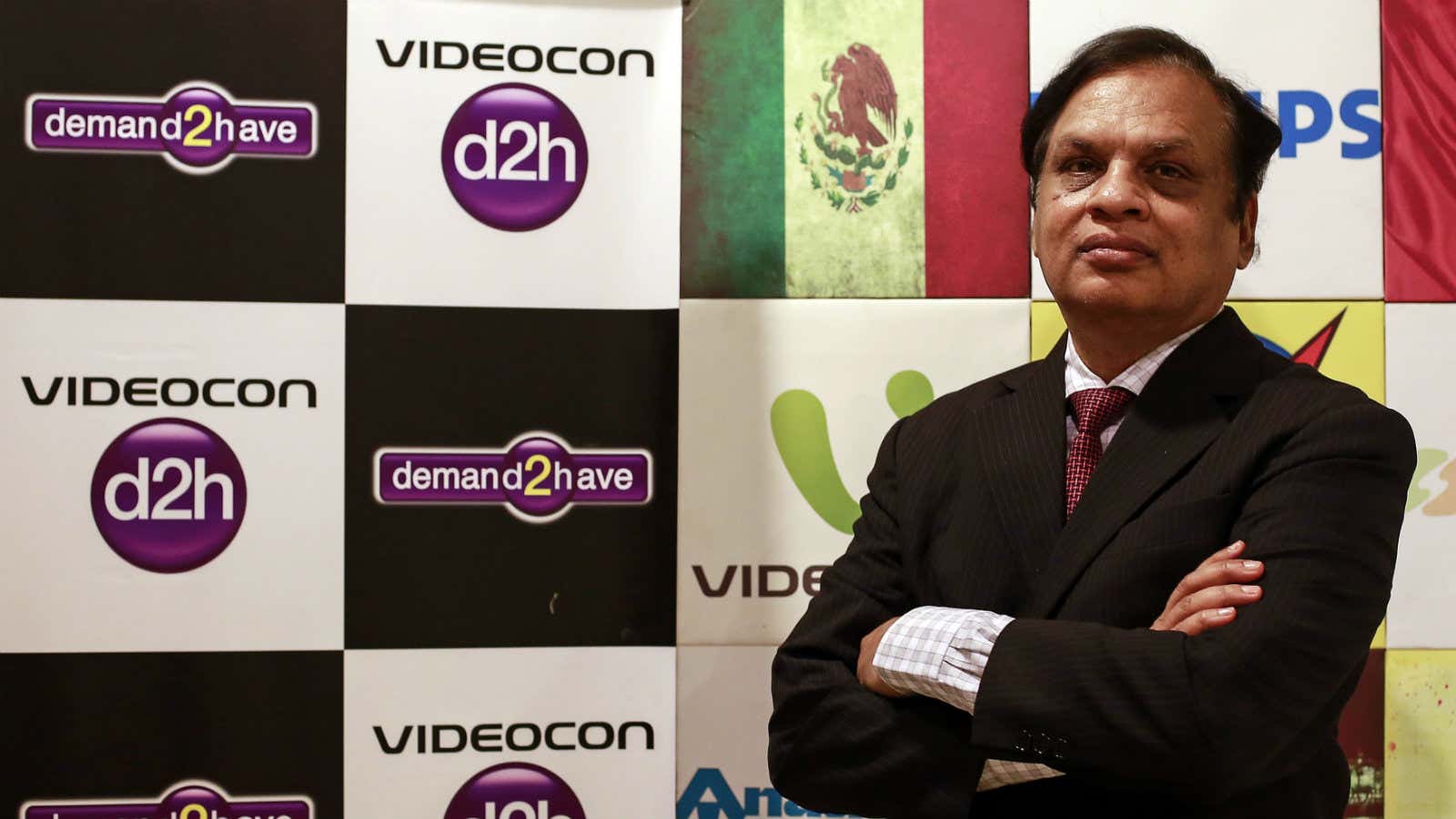Videocon Industries, an Indian electronic appliances maker, reported its annual financial results on Feb. 11. The company made a Rs1,367.94-crore loss (pdf) in 2016 (Videocon uses the calendar year to report). That’s 24.5 times the loss it made in 2015. The whopping increase is due to two main reasons: falling revenues and high debt.
The Mumbai-based company owes over Rs45,000 crore to lenders. This debt was accumulated over time as Videocon expanded into oil and gas, telecommunications, and direct-to-home (DTH) TV. However, its main business of electronic appliances is struggling to make the money required to service the debt, and the new ventures haven’t shown tremendous promise.
The Videocon case is classic of companies aggressively borrowing to expand but failing to repay. In 2016, its finance costs stood at Rs2,426 crore, primarily due to the interest paid. Compared to this, its operating profit was a mere Rs354.87 crore.
Videocon is among the most-leveraged groups in Asia’s third-largest economy. In fact, a Credit Suisse study in October 2015 named it among the 10 groups with the highest debt in India. Several experts, including former Indian central banker Raghuram Rajan, have repeatedly voiced their concerns about the ticking time bomb of corporate debt in India. These high borrowings often translate into toxic assets for banks. “Moderation is required and some debt is good. But not too much. Avoid over-borrowings to avoid problems,” Rajan said in December 2015.
Quartz tried to contact Anirudh Dhoot, director of Videocon, for a comment, but he wasn’t immediately available.
The Videocon story
The Videocon group began in 1955 when Nandlal Dhoot started a sugar mill by importing machinery from Europe. In 1986, Nandlal’s three sons, Venugopal, Rajkumar, and Pradipkumar, started Adhigam Trading, a firm selling paper tubes, which later expanded to the manufacturing of television sets and washing machines.
Its growth in the 1990s, when it added more products such as air conditioners, refrigerators, and home entertainment systems, was synonymous with India’s liberalisation of its economy. On Feb. 14, 1991, the company changed its name from Adhigam Trading to Videocon Leasing & Industrial Finance.
Subsequently, it added more businesses and rapidly expanded, diversifying into oil and gas in the late 1990s and later even telecom, DTH entertainment, and retail. Through the 2000s, it was in a major expansion mode, mirrored by its rising debt. For instance, in February 2007, US telecom giant Verizon tied up with it to provide long-distance tele-services in India. In the same year, Videocon, jointly with Bharat Petroleum Corporation, signed an agreement to buy a Brazilian company to pursue oil exploration in the region.
But such expansion has come with risks.
The debt trap
Since 2007, Videocon’s debt has shot up by seven times. And that’s not all. The group’s interest paying capacity has deteriorated during the same time. Its interest coverage ratio, the ratio of operating profit to the interest payable, is below one, according to Credit Suisse. This means it doesn’t generate enough funds that can cover its annual interest payments.
Some 85% of its revenue comes from its consumer electronics business. In 2016, this segment saw a 15% drop in income. The Indian appliance and consumer electronics industry, estimated to reach $20.6 billion by 2020, has lately seen weak growth. Mounting input costs are squeezing margins even though demand is growing. The industry has also seen a shift from off-line to online shopping.
Meanwhile, Videocon’s crude oil and natural gas venture saw revenues dip by 39% mostly due to a glut in global oil prices.
The group is now trying hard to trim debt. For one, it is selling off assets, something most leveraged Indian groups with their backs to the wall do. Over the last one year, Videocon has sold Rs11,000 crore worth of assets. It has also monetised other assets like spectrum, besides merging its DTH service with Dish TV.
It’ll be a long while though before Videocon comes out of its debt trap.
Suneera Tandon contributed to this story.
